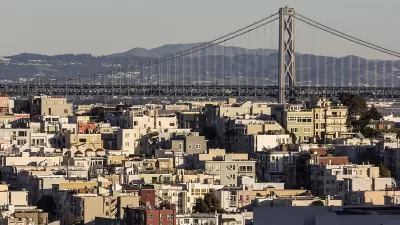On June 29, the California Strategic Growth Council awarded $121.9 million in Greenhouse Gas Reduction Funds to help build 28 affordable housing developments on major transit lines. Funding originates from proceeds of the cap-and-trade market.
While the California Air Resources Board (CARB) which operates the cap-and-trade program began selling permits for emitting carbon in November 2012, these are the first grants and loans awarded by the Strategic Growth Council (SGC).
"Today’s awards are part of the Affordable Housing and Sustainable Communities Program, which is being implemented by the Department of Housing and Community Development in coordination with the Strategic Growth Council and California Air Resources Board," reads the SGC press release [PDF].
"The Affordable Housing and Sustainable Communities Program will fund projects all over the state by supporting compact development along transit corridors,” said California Business Consumer Services and Housing Secretary Anna Caballero. Seventy-seven percent of this year’s recommended grants benefit disadvantaged communities. By law, at least 50 percent of funding must be dedicated to affordable housing and benefit disadvantaged communities [pg. 27 of Program Guidelines (PDF)].
In the Bay Area, $47 million will fund 777 affordable units in 11 projects located in San Francisco, the East Bay and San Jose. Two "regional agencies, the Association of Bay Area Governments (ABAG) and the Metropolitan Transportation Commission (MTC), played a key role in vetting and supporting the Bay Area projects submitted to the Strategic Growth Council, which awarded the funds at a meeting in Sacramento," according to an ABAG press release available on PR Newswire.
The Affordable Housing and Sustainable Communities Program stems from California's Budget Act of 2014, which was signed by Governor Edmund G. Brown Jr. and appropriated $832 million in Cap-and-Trade auction proceeds to reduce greenhouse gas emissions, strengthen communities and improve quality-of-life. By statute, 20 percent of the Cap-and Trade funding will flow to the Affordable Housing and Sustainable Communities Program [posted here and here], which could go from $122 million in the 2014–15 fiscal year to $400 million or more in the 2015–16 fiscal year.
The Cap-and-Trade Program is the only state-run program of its kind in the United States. It was created by the landmark Global Warming Solutions Act of 2006 known as AB 32.
"In 2012, the Legislature passed Senate Bill 535 (De León) directing that, in addition to reducing greenhouse gas emissions, a quarter of the proceeds from the Greenhouse Gas Reduction Fund must also go to projects that provide a benefit to disadvantaged communities," according to CalEPA.
FULL STORY: State Approves $47 Million in Affordable Housing Grants for 11 Bay Area Projects

Maui's Vacation Rental Debate Turns Ugly
Verbal attacks, misinformation campaigns and fistfights plague a high-stakes debate to convert thousands of vacation rentals into long-term housing.

Planetizen Federal Action Tracker
A weekly monitor of how Trump’s orders and actions are impacting planners and planning in America.

In Urban Planning, AI Prompting Could be the New Design Thinking
Creativity has long been key to great urban design. What if we see AI as our new creative partner?

California Creates Housing-Focused Agency
Previously, the state’s housing and homelessness programs fell under a grabbag department that also regulates the alcohol industry, car mechanics, and horse racing.

Chicago’s Ghost Rails
Just beneath the surface of the modern city lie the remnants of its expansive early 20th-century streetcar system.

Baker Creek Pavilion: Blending Nature and Architecture in Knoxville
Knoxville’s urban wilderness planning initiative unveils the "Baker Creek Pavilion" to increase the city's access to green spaces.
Urban Design for Planners 1: Software Tools
This six-course series explores essential urban design concepts using open source software and equips planners with the tools they need to participate fully in the urban design process.
Planning for Universal Design
Learn the tools for implementing Universal Design in planning regulations.
planning NEXT
Appalachian Highlands Housing Partners
Mpact (founded as Rail~Volution)
City of Camden Redevelopment Agency
City of Astoria
City of Portland
City of Laramie




























